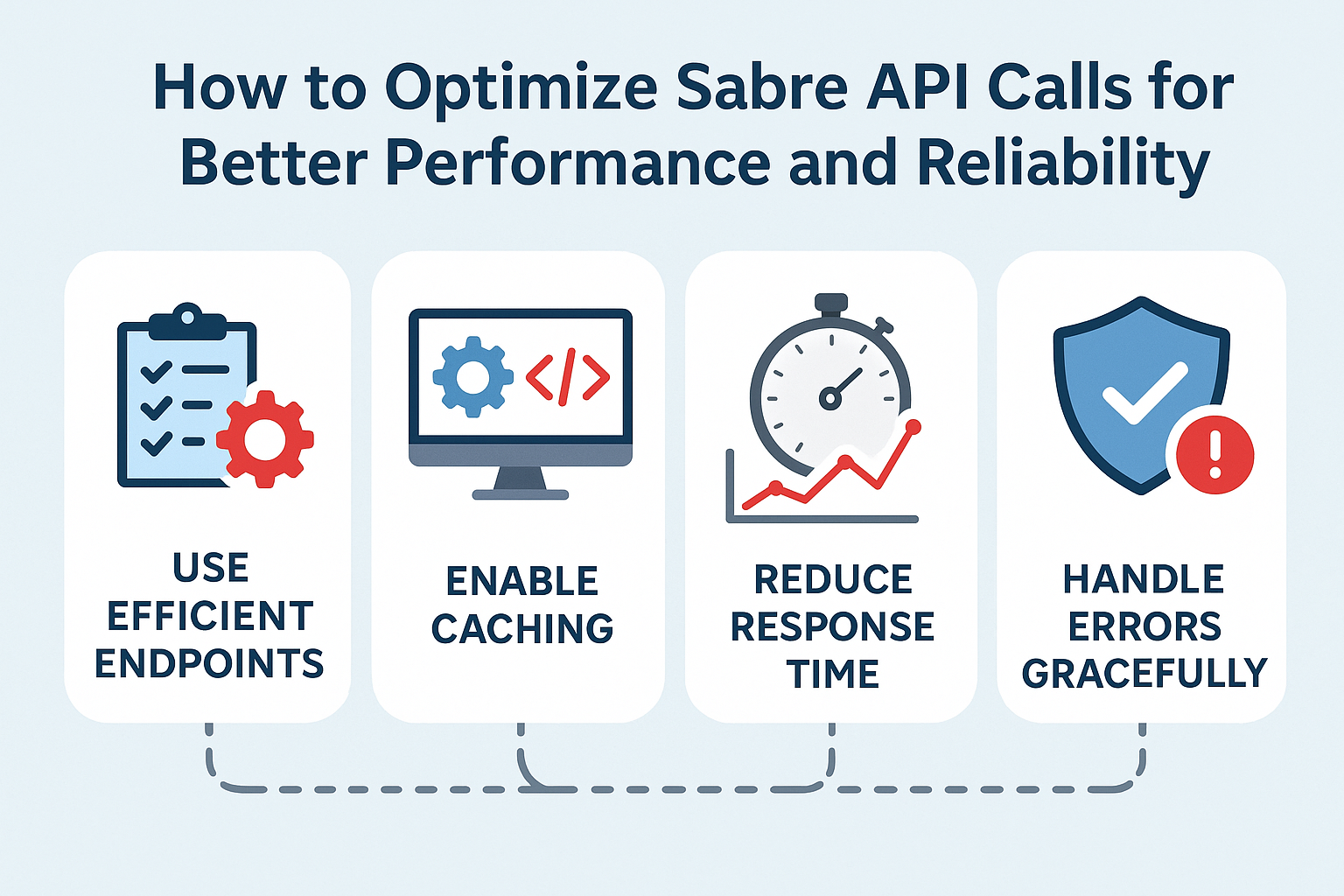How to Optimize Sabre API Calls for Better Performance and Reliability

In the highly competitive travel technology space, seamless and efficient access to flight, hotel, and other travel inventory is crucial. Sabre API Integration serves as a vital bridge connecting travel agencies, OTAs, and other platforms with Sabre’s extensive travel content. However, merely integrating with Sabre API is not enough. Optimizing Sabre API calls is essential to ensure faster responses, lower latency, and higher reliability, ultimately enhancing user experience and operational efficiency.
Introduction to Sabre API Integration
Sabre is one of the world’s leading global distribution systems (GDS) providing access to travel data such as flights, hotels, car rentals, and more. Sabre API Integration enables travel companies to fetch this data and book services directly via their applications.
While Sabre offers powerful APIs, the volume and complexity of requests can lead to latency, errors, or throttling if not managed well. Therefore, optimizing API calls becomes a cornerstone for building robust travel solutions.
Why Optimization Matters in Sabre API Calls
In the travel industry, timely access to accurate data and instant booking confirmations are critical to delivering a seamless customer experience. When Sabre API calls are not optimized, several problems can arise:
Slow Response Times: Unoptimized calls can cause delays, negatively affecting user experience and potentially leading to lost bookings.
Higher Operational Costs: Excessive or redundant API requests increase bandwidth usage and processing costs.
Risk of Rate Limits and Throttling: Sabre imposes limits on the number of API requests. Frequent overuse can lead to throttling, disrupting service availability.
Increased Errors and Session Timeouts: Poorly managed calls can cause more frequent errors and session expirations, reducing system reliability.
Scalability Issues: As your business grows, inefficient API usage can hinder your ability to scale smoothly and meet increasing demand.
Optimizing Sabre API calls ensures that your system remains fast, reliable, and cost-effective, handling varying traffic loads with ease and maintaining excellent service quality.
Best Practices to Optimize Sabre API Calls
Efficient Authentication Handling
Sabre APIs require authentication tokens for access. Instead of requesting a new token for every API call, cache the authentication token and reuse it until it expires. This reduces unnecessary authentication requests and improves overall API call efficiency.
Minimize API Calls with Caching
Wherever possible, cache static or infrequently changing data such as airport codes, airline lists, and fare rules. This reduces redundant calls to the Sabre API and lowers latency.
Use Bulk Requests Where Possible
Sabre APIs support batch or bulk requests for certain endpoints. Instead of making multiple individual calls, combine requests to fetch data in bulk, reducing network overhead.
Proper Error Handling and Retry Logic
Implement robust error handling to gracefully manage API failures such as timeouts or server errors. Use exponential backoff strategies for retries to avoid overwhelming Sabre’s servers.
Optimize Payload Size
Ensure that the request payloads contain only the necessary data fields. Avoid overfetching by specifying the required fields explicitly in your API requests.
Leverage Asynchronous Processing
For operations that are not user-interactive, such as nightly fare updates, use asynchronous API calls or batch processing to minimize blocking and improve throughput.
Monitor and Analyze API Usage
Continuously monitor API usage patterns using logging and analytics tools. Identify slow endpoints, frequent errors, or redundant calls to fine-tune your integration.
Tools and Techniques for Sabre API Performance Monitoring
Logging: Maintain detailed logs of every API request and response, including timing information. This helps pinpoint slow endpoints or bottlenecks affecting performance.
APM Tools: Utilize Application Performance Monitoring (APM) solutions like New Relic or Datadog to continuously track API latency, error rates, and system health, providing real-time insights.
Rate Limit Tracking: Monitor your API call volume against Sabre’s imposed rate limits to avoid throttling or service disruptions. Implement alerting to stay within usage quotas.
Load Testing: Use tools such as JMeter or Postman to simulate high traffic and stress-test your integration, ensuring the system can handle peak loads without performance degradation.
Common Pitfalls and How to Avoid Them
Ignoring Rate Limits: Sabre enforces rate limits to protect its infrastructure. Disregarding these limits may lead to throttling and downtime. Always implement throttling and backoff mechanisms to respect these limits.
Redundant Calls: Repeatedly requesting the same data wastes resources and slows down response times. Apply caching strategies to minimize unnecessary API calls.
Poor Error Handling: Failing to manage transient errors properly results in failed operations and poor user experience. Incorporate retry logic with exponential backoff and fallback procedures to improve reliability.
Large Payloads: Sending or requesting excessive data unnecessarily increases latency. Optimize your requests by selecting only required fields and using pagination to manage large datasets.
Conclusion
Optimizing Sabre API calls is essential for any business relying on Sabre API Integration to deliver travel services. By implementing efficient authentication, caching, bulk requests, robust error handling, and continuous monitoring, you can significantly improve the performance and reliability of your travel applications.
Well-optimized Sabre API integration not only enhances customer satisfaction with fast and reliable booking experiences but also reduces operational costs and improves scalability.
FAQs
Q1: How often should I refresh my authentication token in Sabre API Integration?
Typically, tokens expire after a specific period (e.g., one hour). Cache the token and refresh only when expired to avoid unnecessary authentication calls.
Q2: Can I cache fare and availability data from Sabre APIs?
Yes, but be cautious as fares and availability can change rapidly. Cache only for short durations and validate freshness frequently.
Q3: What is the best way to handle rate limits in Sabre API Integration?
Implement a throttling mechanism with exponential backoff to manage your request rate without causing service interruptions.
Q4: How can I monitor the health of my Sabre API calls?
Use logging combined with APM tools to track latency, error rates, and usage patterns continuously.
Note: IndiBlogHub features both user-submitted and editorial content. We do not verify third-party contributions. Read our Disclaimer and Privacy Policyfor details.
















